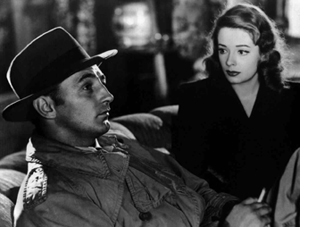| Sun | Mon | Tue | Wed | Thu | Fri | Sat |
|---|---|---|---|---|---|---|
| 1 | 2 | 3 | 4 | 5 | ||
| 6 | 7 | 8 | 9 | 10 | 11 | 12 |
| 13 | 14 | 15 | 16 | 17 | 18 | 19 |
| 20 | 21 | 22 | 23 | 24 | 25 | 26 |
| 27 | 28 | 29 | 30 | 31 |
CATEGORIES
RECENT ENTRIES
BLOG ROLL
Baby, I don’t care
 Who’s that? What just happened? I thought she was dead. Are we supposed to know what he knows?
Who’s that? What just happened? I thought she was dead. Are we supposed to know what he knows?
Robert Pippin got a big laugh with his approximation of what goes through many viewers’ heads when watching classic American film noir, with its labyrinthine plot lines and broken links between cause and effect, intention and action. Those of us who had recently screened the film at the center of his March talk, “Trapped By Oneself in Jacques Tourneur’s Out of the Past,” could relate.
In the 1947 film, Robert Mitchum plays Jeff Bailey, an ex-hood who’s trying to lead a new, clean life in a new, clean town. In the opening scene Jeff is discovered by a former associate and, like Michael Corleone after him, pulled inexorably back into a world of crime and double-crossing. Doing most of the heavy pulling is Jane Greer as Kathie Moffat—the femme fatale without whom no noir would be complete. During the key San Francisco sequence, keeping track of the rapid succession of plot twists is all but hopeless.
So are the destinies of film noir characters, which seem ruled by an ancient form of fate. Grim urban settings, cold-blooded murders, official corruption, bitter irony toward the American Dream, a sense of predetermination: this is what film noir is made of, said Pippin, the Evelyn Stefansson Nef distinguished service professor of social thought, philosophy, and in the College. He focused on the disconnect between noir characters’ motives and their actions. The first noir line, he said, might be one in Oedipus at Colonus: "I suffered those deeds more than I owned them." “In this genre,” Pippin observed, “people say over and over, ‘I’m not going to do that,’ and then they do it.” Or they plan an action, meeting the formal requirements of agency, but don’t follow through.
If they did, they would be acting within the American philosophical tradition of reflective action; but in American noir nobody fits this model. When Kathie, whom Jeff suspects of treachery, protests her innocence, he responds with the famous line “Baby, I don’t care” (also the title of Lee Server’s first-rate Mitchum biography). Moments later they’re kissing, but Mitchum’s back to the camera prevents us from reading his character’s motivation.
Pippin's talk was the first of three in a series, “Fatalism in Film Noir: Some Cinematic Philosophy,” analyzing the philosophic condition of noir heroes or antiheroes. The two subsequent talks looked at Orson Welles’s The Lady from Shanghai and Fritz Lang’s Scarlet Street. Pippin will deliver all three again next week as the 2010 Page-Barbour lecturer at the University of Virginia.
Laura Demanski, AM’94
March 31, 2010
